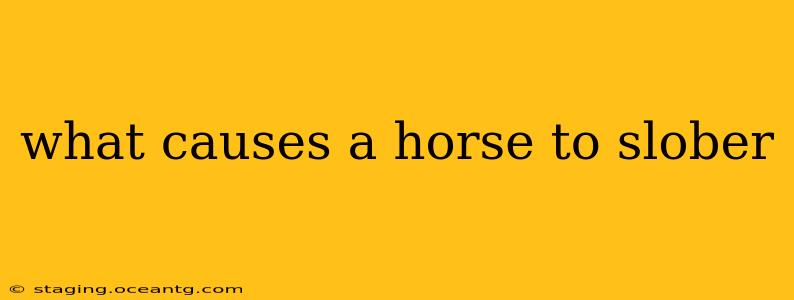Horses, much like humans, can experience excessive salivation, often referred to as slobbering. While a small amount of saliva is normal and essential for digestion, copious drooling can indicate a variety of underlying issues. Understanding the causes of excessive salivation in horses is crucial for ensuring their health and well-being. This comprehensive guide will explore the various reasons why your horse might be slobbering, helping you identify potential problems and seek appropriate veterinary care when necessary.
Why Does My Horse Drool So Much? Common Causes of Excessive Salivation
Several factors can contribute to a horse slobbering excessively. These range from relatively benign causes to more serious medical conditions requiring veterinary attention. Let's delve into some of the most frequent culprits:
Dental Issues: This is arguably the most common cause of excessive salivation in horses. Sharp points on teeth, broken teeth, misaligned jaws (malocclusion), periodontal disease, and abscesses can all make chewing painful and uncomfortable, leading to increased saliva production. The horse may also drop feed, further contributing to the perception of excessive drooling.
Mouth Irritation or Injury: Anything irritating the delicate tissues inside a horse's mouth can trigger excessive salivation. This includes ulcers, cuts, infections, and foreign bodies like pieces of wire or thorns.
Certain Medical Conditions: Various medical conditions can contribute to hypersalivation in horses. These include:
- Cushing's Disease: This hormonal disorder can lead to increased salivation, along with other symptoms like a pot-bellied appearance and changes in coat.
- Neurological Problems: Problems with the nervous system can affect the control of salivation, resulting in excessive drooling.
- Esophageal Obstructions: If something is blocking the esophagus, the horse may drool extensively.
- Choke: A common equine emergency, choke occurs when food becomes lodged in the esophagus. This typically involves significant saliva production.
Bitting Issues: The type of bit used, how it fits, and the rider's handling can all impact a horse's salivation. An ill-fitting or harsh bit can cause discomfort and irritation, leading to increased drooling.
Excitement or Stress: Just like humans, horses may slobber when excited, anxious, or stressed. This is usually temporary and less of a concern than persistent drooling.
Medications: Certain medications can have hypersalivation as a side effect.
Is My Horse's Slobbering Normal? When to Seek Veterinary Attention
While some temporary slobbering might be benign, persistent or excessive drooling warrants veterinary attention. It's crucial to observe your horse for other accompanying symptoms like difficulty eating, weight loss, lethargy, changes in behavior, or any signs of pain. Don't hesitate to contact your veterinarian if you notice any of the following:
- Sudden onset of excessive salivation
- Slobbering accompanied by other symptoms
- Drooling that persists for more than a day or two
- Difficulty eating or drinking
How is Excessive Salivation in Horses Diagnosed and Treated?
Your veterinarian will conduct a thorough examination, which may involve a dental exam, a physical examination, and possibly blood tests or X-rays, depending on the suspected cause. Treatment will depend entirely on the underlying cause. This could range from simple adjustments to the bit, addressing dental issues through floating (filing down sharp edges), treating infections with antibiotics, or managing underlying medical conditions with appropriate medication.
By carefully observing your horse and seeking veterinary assistance when necessary, you can help ensure their overall health and well-being and address the root cause of any excessive salivation.
